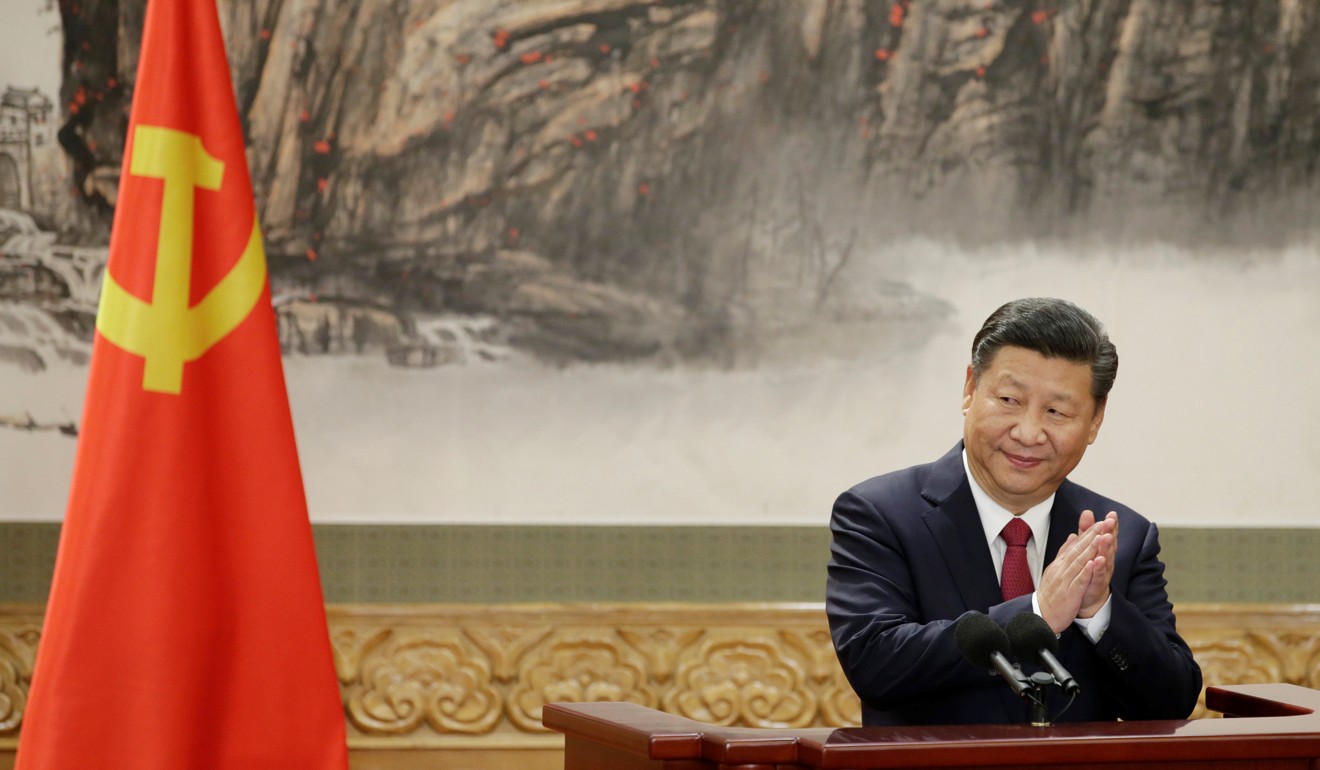President’s failure to nominate a successor ends a 25-year tradition, but Wang Qishan’s departure is in line with ‘rules’ on retirement
The Communist Party of China unveiled its new leadership on Wednesday, with perhaps the most notable points being the retirement of anti-graft chief Wang Qishan and the exclusion from the Politburo Standing Committee of anyone who would still be young enough to take over from President Xi Jinping in five years’ time.
Xi and Premier Li Keqiang were the only two incumbents to retain their seats on the committee, China’s highest decision making body. They were joined by Xi’s chief of staff Li Zhanshu, Vice-Premier Wang Yang, the ideology mastermind behind three presidents Wang Huning, the party’s new anti-graft chief Zhao Leji and Shanghai’s party boss Han Zheng.
Li Zhanshu is expected to take over China’s legislature; Wang Yang is tipped to head the country’s political advisory body; Wang Huning will head the Central Secretariat, the party’s nerve-hub; and Han is likely to serve as deputy premier.
The line-up was largely as suggested in earlier reports by the South China Morning Post.

The formidable Wang Qishan, 69, stepped down despite speculation he might remain beyond the generally accepted retirement age of 68.
The number of seats on the Standing Committee was unchanged at seven despite suggestions that Xi might trim it down to make securing a majority vote that much easier.
Chen Daoyin, an associate professor at Shanghai University of Political Science and Law, said that although Xi’s authority within the party was well recognised, the new Standing Committee line-up suggested he might still face some constraints.
“The line-up largely obeys the unwritten conventions [that have been in place since] Deng Xiaoping,” he said.
“That includes the ‘seven up, eight down’ rule and promotion based on seniority, though he did break the conventions on successors.”
The party’s constitution does not set out any rules on retirement, but an unwritten convention – that anyone aged 68 or older retires and no one older than 67 joins – has been strictly followed at Politburo Standing Committee reshuffles since 2002.
While Wang’s departure showed there was still some regard for convention, Xi’s failure to endorse a successor – as all of his predecessors for the past 25 years had done by the end of their first terms – was a significant break from tradition.

The rationale for the nominated successor arrangement is to give the future leader time to prepare for the role. As was the case with Hu Jintao and Xi himself, the process involves the candidate simultaneously holding a seat on the Standing Committee, being the highest ranked member of the Central Secretariat, and being given the ceremonial title of vice-president to allow him to make foreign visits.
However, neither of the two men currently considered most likely to succeed Xi – Hu Chunhua and Chen Miner, the party bosses of Guangdong and Chongqing, respectively – were elevated to the Politburo Standing Committee. Chen, who worked under Xi during his time in Zhejiang, and Hu, are, however, still members of the 25-member Politburo.
Not everyone, however, is convinced that Xi is trying to ensure an extended term of rule for himself.
The departure from the succession convention has raised questions about Xi’s own retirement plans, or lack thereof.
The switch from tradition adds to the speculation that began when Xi was anointed as the party “core” last year. All previous “cores” in the history of China’s Communist Party led for more than two five-year terms. Supreme leaders Mao Zedong and Deng Xiaoping ceded power only on their deaths, while Jiang Zemin, after stepping down as president, continued as a military leader.
“If nobody is appointed, the first explanation is not that Xi is trying to stay on, but rather that there is no one that is seen as a suitable replacement,” Trey McArver, co-founder of Beijing-based research firm Trivium China, said.
“I think the perception going into Xi’s tenure was that there needed to be a unified leadership, and appointing a successor five years in advance almost by definition serves to start creating different power centres at the very top.”
In another move to concentrate the president’s power, the party on Wednesday cut the number of seats – under Xi and his two vice-chairmen – on the powerful Central Military Commission from eight to four. The remaining positions will be occupied by the former commander of the missile force, the present commander of the Joint Staff Department, the director of the PLA’s political department, and the PLA’s graft-buster.
The new line-up of the Politburo also sent a strong message about China’s assertive foreign policy plans for the next five years, with the promotion to the body of Yang Jiechi, the country’s top diplomat.
He is the first professional diplomat to hold such a position in China for 15 years, and is now a front runner to become a vice-premier.
Dibyesh Anand, an associate professor at London’s Westminster University, said the move conformed to the globalist message Xi delivered at the congress.
“China is keen to cement and expand its role as a major global power. Yang has extensive hands-on diplomatic experience with the US, Japan and India, and if he maintains that approach it will augur well for smooth relations between China and other major powers,” he said.
“However, Xi’s personality ensures it is he who will be paramount when it comes to not only domestic politics but international relations, so Yang’s role will be to facilitate Xi’s vision of China as a great power diplomatically,” he said.

